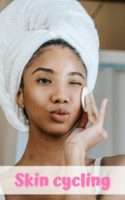In the vast world of beauty and skincare trends, a recent buzz has been around skin cycling. Popularised by dermatologist Dr Whitney Bowe on TikTok, this nighttime skincare routine focuses on using fewer products in a specific way to achieve healthier-looking skin. Let’s delve into the routine and explore what experts have to say about it.
The skin cycling routine spans four nights, each with its unique focus:
Night 1 – Exfoliate: Exfoliation removes dead skin cells, revealing a radiant glow. Exfoliants containing ingredients like lactic acid or glycolic acid are used to achieve this effect.
Night 2 – Retinols: Retinols are known for their anti-ageing properties and their effectiveness against acne and large pores. When combined with other products, it’s crucial to use retinol every other day to prevent negative reactions or skin irritation.
Night 3 and 4 – Rest days/Moisturizer: Now it’s time to give your skin a breather. Nights 3 and 4 allow your skin to recover from the previous steps, focusing on hydrating and moisturising products.
Of course, it’s important to begin each night by cleansing your face before starting the routine. You can repeat the steps once you’ve completed the four-night cycle.
To gain further insight into skin cycling, we turned to Professor Rannakoe Lehloenya, Head of Dermatology at Groote Schuur Hospital and the University of Cape Town.
Fundza: Can you tell us more about skin cycling?
Professor Rannakoe Lehloenya: First of all, I would like to clarify that ‘skin cycling’ is a concept that has social media origins and does not exist in scientific medical literature. However, this does not mean that there is no scientific merit to the concept.
Skin cycling refers to a systemic method of allowing the skin to take a break from harsh products that are routinely used.
The two main procedures that skin recycling aims to minimize and allow the skin to recover from are i) application of retinoids (vitamin A derivatives) and ii) exfoliation. Exfoliation refers to chemical or physical removal of the top layer of the skin made up of dead cells. This top layer of the skin has evolved over millions of years in humans and is critical for the maintenance barrier function of the skin.
Fundza: What are the benefits of skin cycling?
Professor Rannakoe Lehloenya: The benefit of skin recycling is to effectively allow the top protective layer of the skin to return to as normal a baseline as possible by limiting the use of substances and procedures that strip it off.
Removal of the top protective layer has well-known cosmetic and hygiene benefits, but its excessive removal results in i) loss of barrier function ii) scarring and iii) excessive inflammation. Excessive, persistent inflammation of the skin is undesirable, particularly in darker skin, where it is associated with excessive pigmentation. Limiting exfoliation and the use of retinoids gives the skin a break and limits potential adverse effects.
Fundza: Are there any side effects of skin cycling?
Professor Rannakoe Lehloenya: There are no side effects in those who are already using exfoliants and retinoids on their skin, as this effectively limits their exposure. On the other hand, if the protocols effectively introduce new users to exfoliation and retinoids, it then exposes those recruits to their well-established adverse effects that skin cycling tries to mitigate.
Fundza: What are your thoughts on skin cycling?
Professor Rannakoe Lehloenya: The phrase ‘skin recycling’ incorrectly suggests that the procedure produces new skin which is not the case. I would rename it ‘skin replenish’ or any other synonym. Skin cycling is effectively a recognition and a corrective measure acknowledging that some of the products that are regularly used in the skin are harsh and not good for the overall health of the skin. I would support the concept of skin cycling because it goes some way to mitigate excessive use of exfoliants. However, the blanket approaches on social media on the steps to follow do not consider individual customer skin variations and they are not supported by any scientific evidence although they are theoretically plausible.
Final Word
Is skin cycling a beneficial skincare routine, or is it another passing trend fueled by social media? The decision is ultimately yours to make! Take a closer look, explore the opinions of experts, and find out whether skin cycling is the right fit for your skincare journey.
***
Tell us: What type of products do you use in your skincare routine?
Read more here on learning about hair products.


